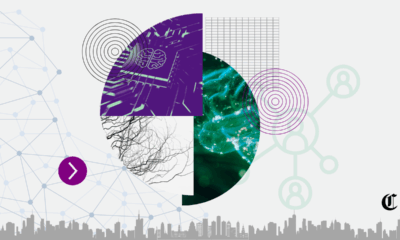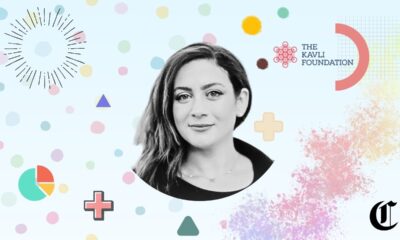Stories in Science Special Series
Humans of HBI: Caroline Palavicino-Maggio
Caroline Palavicino-Maggio: “During my childhood, I watched violent crimes transform my neighborhood. Now as a postdoc, I aim to understand the origin of aggressive behavior that underpins violent crimes. Though my work is rooted in neurobiology, I hope it will eventually metamorphose to have direct implications in understanding how our brains work when exhibiting aggression.”

Caroline Palavicino-Maggio
[su_boxbox title=”About”]Dr. Palavicino-Maggio is a neuroscientist in the lab of Ed Kravitz in the Department of Neurobiology at Harvard Medical School. She studies how the brain regulates aggressive behavior. In her current project, she is identifying and characterizing the brain cells that activate female aggression. She uses the fruit fly model system because it allows one to control the activity of specific brain cells, and the genes those brain cells express—and then to infer whether or not that brain cell, region, or gene is involved in aggression. The story is co-published in collaboration with the Harvard Brain Science Initiative (HBI). Cover image by Celia Muto.[/su_boxbox]

Caroline Palavicino-Maggio – Photo by by Celia Muto
What career did you aspire to as a child and why?
I was born in Harlem on 139st street and grew up in Washington Heights on 187th street. Later in my life, we moved across the George Washington Bridge to a small factory town called Edgewater. My mom sold home and food items on the streets to make ends meet. My dad worked for the New York City Housing Authority Projects for 35 years as an elevator mechanic. We were four siblings: my brother Jose, sister Angie, me, and my little sister Jackie. When I was 13 years old, I experienced a life altering event when my sister Angie ended her own life. As with anyone in this situation, I struggled to come to terms not just with the loss of my sister, who was also my idol, my best friend, my everything, but the implications of the way Angie had died. Knowing her so well, I couldn’t understand what caused her suicide. Was it something in her relationships with others, including me? Survivors of suicide are often plagued with feelings of guilt and confusion, and I wanted to find an explanation for this seemingly inexplicable event in my life. Ultimately, I focused my scientific interest on questions of the interactions between brain functioning and neurochemistry in the context of behavior.
What is the hardest part about the work you do?
There are not enough tenure track positions available in neuroscience. There are also not many Latinas such as myself in academia. I know this will be a huge hurdle to overcome. No matter how great this challenge will be, I can never give up trying to make a space for diverse voices to be heard in neuroscience.
Who or what most inspires you and why?
During my childhood, I watched violent crimes transform my neighborhood. Now as a postdoc, I aim to understand the origin of aggressive behavior that underpins violent crimes. Though my work is rooted in neurobiology, I hope it will eventually metamorphose to have direct implications in understanding how our brains work when exhibiting aggression. I hope my work can eventually lead to contributions in criminal psychology, law, and society at large.
Which teacher made the biggest impact on your life?
As a student in New York’s Public School System, I was always intrigued by science, but never received any formal mentorship or encouragement to pursue a career in science. As a high school student, attending college seemed far out of reach, let alone embarking upon the daunting path of doctoral training. Because I never had formal mentorship as a high school student or undergraduate, the path to PhD was particularly difficult. Long after I graduated college, I saved up enough money to fly to San Diego to attend a meeting for the Society for Neuroscience. On the plane ride there, I sat completely by chance next to Dr. Nick Ingolglia, the Associate Dean of New Jersey Medical School at Rutgers University. He believed in me, mentored me, and encourage me to apply to graduate school. Although Dr. Ingolglia retired while I was in graduate school, I was very fortunate to also have the support and mentorship of my chair and Associate Dean, Dr. Andrew Thomas, who supported my independence and vision in my thesis work. Drs. Ingoglia and Thomas have had a tremendously formative impact on my life, and I now feel that it is my duty to inspire others in the same manner. Thus, the mentorship of young underrepresented students will always remain a key focus of my career as an academic scientist.
What is the trait you admire most in others?
Tenacity! No matter what happens you can never give up. As Dr. Martin Luther King once said, “If you can’t fly then run, if you can’t run then walk, if you can’t walk then crawl, but whatever you do you have to keep moving forward.”
What are some of your interests outside the lab or office?
I currently serve on a few committees at Harvard Medical School, including the Diversity Pipeline of Community Engagement Committee from the Diversity Task Force, and the Equity and Social Justice Committee, both led by Dean Joan Reede. I am also involved with many outreach programs. My most recent project has been with the Journal of Emerging Investigators (JEI), a free, open-access journal committed to helping middle and high school students learn the scientific method and communication. Through JEI, these students are able to publish their research (usually science fair or school projects). We send the students’ reports to peer reviewers (postdocs and graduate students), who submit feedback about their experiments, writing, and figures. Reading articles submitted by their peers, students are empowered to perform independent research projects themselves. Although we receive submissions from around the world, my role as an outreach director has been specifically to recruit publications from Central America, South America and Africa. Currently, I am working on building collaborations with schools in Puerto Rico, Ethiopia and Kenya. We are also launching a pilot program this fall at HMS to open opportunities for underrepresented communities by encouraging publications in science by minorities.
What do you feel most passionately about?
I know first-hand how difficult it is to be a first-generation Latina in this field, and I feel deeply passionate about social justice in science. I am deeply committed to the diversification of science and to the betterment of underrepresented communities.

Family photos provided by Caroline Palavicino-Maggio.
What are your hopes for the future?
Social gatherings are everywhere in science! It is hard to think about what it takes to become a successful scientist other than doing brilliant science. But a strong network of scientist friends is essential for a successful career in academia. Collaborations, peer-reviews and feedback on grants, publications, recommendations, etc. often help one to navigate academia and end up on a successful track. More often than not, minority scientists have a hard time breaking into this social circle. And if we do break in, we may struggle with not losing our identity — trying to mold into the masses rather than speaking about our struggles. This is why many of us do not stay in academia. Science is already difficult as it is, let alone doing it by yourself. It is my belief that a strong social network is an essential part of growth and development in academia. I hope that it will become easier for people of color to break into these networks, with others willing to meet them halfway.
Metrics
Sessions
Total number of Sessions. A session is the period time a user is actively engaged with the page.
Visitors
Users that have had at least one session within the selected date range. Includes both new and returning users.
Page views
Pageviews is the total number of time the article was viewed. Repeated views are counted.
The CS Media Lab is a Boston-anchored civic science news collective with local, national and global coverage on TV, digital print, and radio through CivicSciTV, CivicSciTimes, and CivicSciRadio. Programs include Questions of the Day, Changemakers, QuickTake, Consider This Next, Stories in Science, Sai Resident Collective and more.

-
 Audio Studio1 month ago
Audio Studio1 month ago“Reading it opened up a whole new world.” Kim Steele on building her company ‘Documentaries Don’t Work’
-
Civic Science Observer1 week ago
‘Science policy’ Google searches spiked in 2025. What does that mean?
-
Civic Science Observer1 month ago
Our developing civic science photojournalism experiment: Photos from 2025
-
Civic Science Observer1 month ago
Together again: Day 1 of the 2025 ASTC conference in black and white
Contact
Menu
Designed with WordPress
























